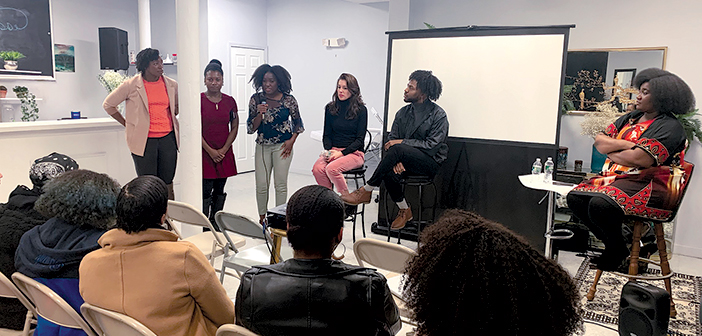Community series brings dermatology expertise to people of color.
When Uzoamaka Okoro ’16 MD’20, EB Henebeng MD’21, and dermatology resident Nicole Negbenebor MD’18 RES’23 organized the Skin of Color Community Series last fall, their goal was to bring dermatological expertise to marginalized communities chronically overlooked by the medical establishment. What they didn’t expect was to inspire new friendships and therapeutic healing.
The three friends bonded over a shared passion for outreach. “We were all looking for some way to involve more of the community and make [skin of color]more of a priority—not only for Brown Dermatology, but for Providence in general,” says Okoro, who graduated in the spring and will complete her dermatology residency at Walter Reed National Military Medical Center. “Before we knew it, we had a program started.”
Even at elite universities, much of medicine is still taught using a “one size fits all” approach, and in dermatology, Caucasian skin is the default, Negbenebor says. As chair of Brown’s Dermatology Diversity Initiative Committee, she regularly reviews lectures for inclusivity. “Dermatology is a very visual field, and pattern recognition is huge,” she says. “If you’re taught that eczema’s always red or pink and dry, but you come across somebody with darker skin that might be a bit purple or darker brown, it could be a lot of different things.” Without proper training, “it can lead to an easy misdiagnosis.”
Okoro and Henebeng have studied various schools’ dermatology curriculums for skin of color inclusivity. “Unfortunately, our results showed that we can do so much better,” Okoro says.
Negbenebor references a common myth: that individuals identifying with different ethnic groups do not get certain skin conditions, and thus don’t require dermatological care. “In America, skin represents so much of who you are, that for dermatology not to be a part of your health story doesn’t make sense,” she says. Even more crucial was connecting with community members “who didn’t already have care established.”
When the series launched in December, panelists were able to make those connections in a comfortable setting: BeauEssence Natural Hair Salon in Providence, owned by Henebeng’s stylist, Rodlyne St. Louis. She offered to host the in-person events, which typically attracted 30 to 40 people; the series is now held virtually.
Brown’s dermatology department lends faculty support at the events, while the Office of Diversity and Multicultural Affairs awarded Petersen Educational Enhancement funds to continue the popular series, which features speakers from different backgrounds and other dermatology programs. Each month a dermatologist presents on a topic and then a panel of experts—including an aesthetician or hairstylist—answers questions from the audience.
The organizers say they hope the “healing community” they built in person at the salon will continue online.
“Seeing some participants come together and share, ‘I feel like I’m not being seen,’ ‘I can’t go to someone I feel comfortable with,’ and having others say, ‘Me too,’” Okoro says, “it felt like a little therapy session. It was really impactful, and it showed me that what we’re doing is valuable.”
For more information about the Skin of Color Community Series, write to soccommunityseries@gmail.com.




